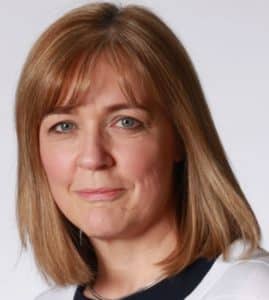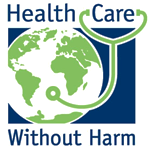Dr Elizabeth Smith is the Breastfeeding Advocacy Lead for Scotland and Queen’s Nurse from the 2018 cohort. In her latest blog, she talks us through her reasons for getting involved in the creation of Health Care Without Harm’s climate-smart infant feeding resources.

Dr Elizabeth Smith, Breastfeeding Advocacy Lead for Scotland and Queen’s Nurse
I sit and write this a day after the hottest day ever experienced in the UK. I have watched the news about weather in Scotland and the rest of the world, as temperatures rise both higher and much earlier than anticipated.
My son, my amazing and beloved only child, is 21 years old in a few weeks. I try to imagine what his life will be like against the frequent predictions of a frightening future for the planet unless we make a change now. I want him to know that his mum tried to be a part of the solution.
I try to be part of the circular economy; my family say that when I go on holiday, I am happy as long as I have been to a cathedral and a charity shop! I concede this is true, I do love to give old things a new home and a purpose again. I donate or give away things that we no longer need or use. I fear sounding like I am preaching when I am far from perfect. I am still learning and making mistakes along the way. However, I am open to change and that is what I can offer.
I started to read more about the environment, and with breastfeeding being my specialist subject should I ever be on Mastermind, I began to see that it had a part to play in making change happen. I was given the opportunity to produce some resources in partnership with Health Care Without Harm (Health Care Without Harm (noharm-europe.org). I worked with the wonderful Anna Fuhrmann and the team there, who are doing terrific work. I recommend that you look at their website and if you work in healthcare, think about what you can do in your part of the world. If you are a nurse, sign up for the Nurses Climate Challenge Europe | NCC Europe.
I quickly recognised that breastfeeding is the most environmentally sustainable method of feeding, no need for farming, no use of freshwater, no power, no plastic, storage, or transport. In times of emergency, it can be lifesaving and protects babies and older children from infection. Thinking about climate action, breastfeeding could be an important part of the solution, but it needs to be supported at both policy and practice levels. In Scotland, we are lucky to have a Government that wants to do this.
I have been involved in writing a three-part resource aimed at healthcare professionals which you can access using the links below:
Part 1 describes the interconnection between the environment, climate change and infant nutrition. I had support in writing this from people who worked with La Leche League, The Breastfeeding Network and The National Childbirth Trust; but they were also involved in ecology, the environment and climate change and able to support with their knowledge in these areas.
Part 2 is about what individual nurses can do to support climate-smart infant feeding, though it is useful for anyone who is involved in supporting new families.
Part 3 is about advocacy for climate-smart infant feeding. It is a case study from Scotland and the work of the Breastfeeding Advocacy Advisory Group that I have the privilege of leading. These amazing people come from the NHS and third sector, and all are passionate about breastfeeding. After engaging in insight gathering across Scotland, we put together a list of work we would need to complete and have been working through this list. We are building momentum and making change happen.
I hope you read and take something from these resources and ask that you share widely with others and start a conversation or two. We can listen and learn together.
Will you join me and be part of the solution? Our children and young people need us to be.
